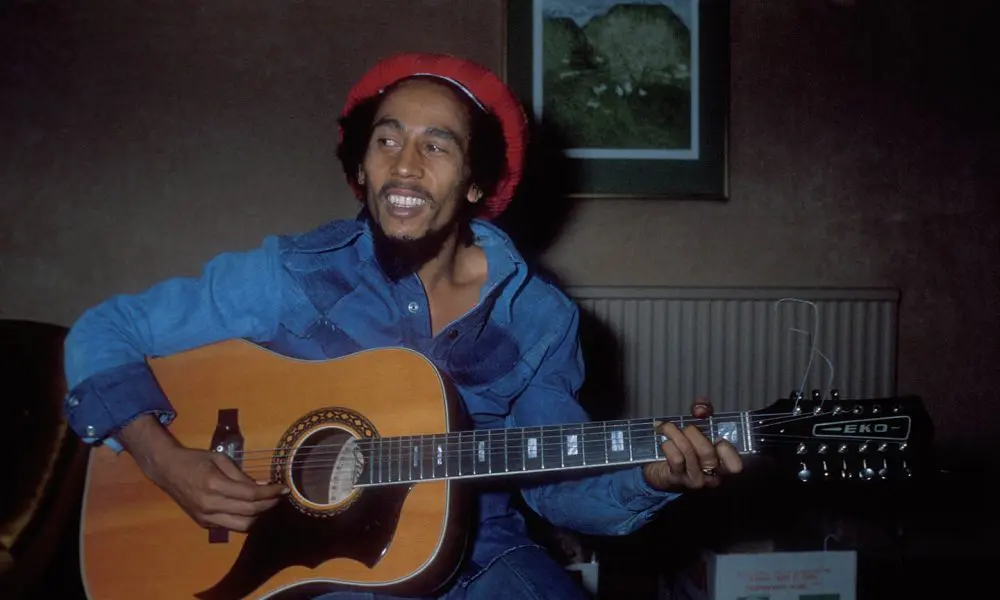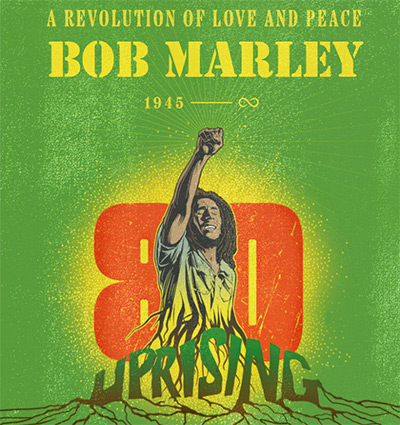‘Three Little Birds’: The Story Behind Bob Marley’s Slow-Burning Classic
Resonating as strongly as ever, ‘Three Little Birds’ was slow to take flight, but now stands as one of Bob Marley’s most affecting songs.

Bob Marley was a gifted songwriter, but sometimes inspiration came to him like a gift received from somewhere else. “Three Little Birds,” a simple, joyful song that has been a hit several times over, was a gift from nature, its writing prompted by the birds that fluttered by the window at 56 Hope Road, Bob’s Tuff Gong HQ, and home during the second half of the 70s.
“It was amazing how he put the words together”
Bob loved nature, and Jamaica is blessed with plenty of wonders to attract his attention, from the exotic streamertail hummingbirds to the humble house sparrow. Nature was frequently used as a metaphor in his songs: the trees in “Small Axe,” the big cat in “Iron, Lion, Zion”, the dog as errant youth in “Craven Choke Puppy.” Birds’ ability to soar while people were chained to the ground helped “Wings Of A Dove” and “Rastaman Chant” take flight – though the latter’s wings belonged to angels. Bob’s feathered friends in “Three Little Birds” eventually flew to places that few other songs could hope to reach: the song is adored even by people who have never heard of Bob Marley & The Wailers, and for whom reggae is the name of a supermarket sauce.
According to Gilly Gilbert, Bob’s close friend, road manager, and fitness partner, who also cooked the “ital food” that kept the singer nourished on tour and at home, “Three Little Birds” arrived as naturally to Bob as singing does to larks. “I remember the three little birds,” he told author Vivien Goldman in 2006. “They were pretty birds who would come by the window at Hope Road.” Gilly witnessed Bob writing the song and recalled, “It was just amazing how he put the words together in a flow.” The I-Threes, Bob’s trio of female backing vocalists, found their own meaning in the lyrics: Bob sometimes called them his “three little birds.” Marcia Griffiths remembered of the song: “We loved it. Even when we were recording it, we knew it was our song.”
A steady rise to “classic” status
Released in 1977 on Exodus, which, in 1999, Time magazine declared The Best Album Of The Century, “Three Little Birds” nested unobtrusively on the second half of the album, while “Jamming” and “Waiting In Vain” claimed hit single status, and the seriously rootsy first half of the album drew critical acclaim.
Compared to, say, Exodus’ title track, or the spiritual “Natural Mystic,” “Three Little Birds” seems a little lightweight, with its simple refrain and message from Bob’s avian visitors that “every little thing is gonna be alright.” But in the same way that the singer patiently waited for the world to catch up with his music after more than ten years of making it, “Three Little Birds” chose to bide its time. Perhaps the fact that the title was not part of the song’s hook, meaning that even today, some listeners believe it is called “Don’t Worry About A Thing” or “Every Little Thing Is Gonna Be Alright,” was a reason why it was not issued as a single in 1977. In 1980, however, “Three Little Birds” was finally freed from its album-shaped aviary, and though it only made the Top 20 in the UK, it began a steady rise to “classic” status. The song was too uplifting, too powerfully perky, to hide in the undergrowth.
Resonates as strongly as ever
Decades after Marley recorded it, “Three Little Birds” became a go-to for artists seeking a song that offered hope and gladness in the face of life’s troubles. Wendy & Lisa, formerly of Prince’s Revolution, created a version fronted by Karen David for the US TV drama Touch in 2012. Maroon 5 delivered their interpretation in 2018; Robbie Williams sang it for his “Corona-oke” on Instagram during the 2020 Coronavirus outbreak; Ziggy Marley and Sean Paul recorded it for the 2004 animated movie Shark Tale; and Steven Marley remixed it on Legend: Remixed. Billy Ocean’s version appears on his The Best Of collection, and the song graces a compilation of the same title by Brazilian legend Gilberto Gil. A version by Britain’s Got Talent child star Connie Talbot was a conspicuous success on both sides of the Atlantic in 2008. But Bob Marley’s original remains definitive. Those “Three Little Birds” may have long since flown, and so has Bob, but the inspiration one gave to the other resonates as strongly as ever.
Listen to the best Bob Marley songs on Apple Music and Spotify.













Patrice
March 19, 2024 at 9:18 pm
This is remarkably written and interpreted for others to get in depth with this Iconic LEGEND! Jah RASTAFARI!